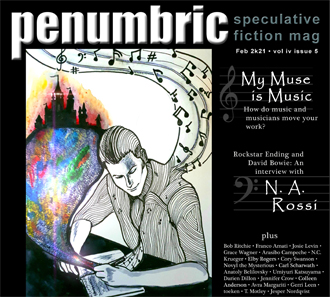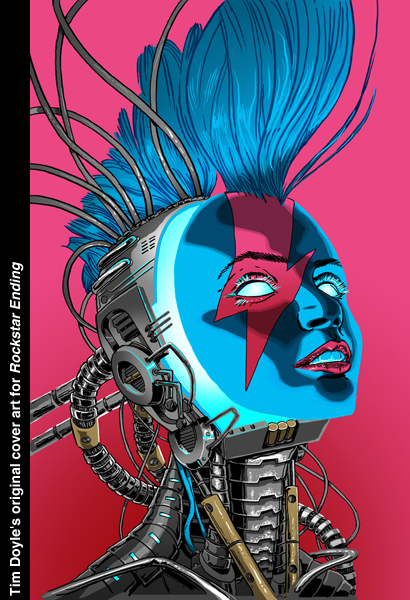
Tim Doyle's original cover art for Rockstar Ending.
Music as an assist to suicide--or used by the government to put one over the edge--could be a dark place to start in a series that integrates music as extensively as Nicola Rossi's Rockstar Ending books, but then, they started life as a short story, "One Last Gift," which won a dystopian fiction award from the Orwell Society. However, music is used in not just sinister, but also uplifting ways. This extends into the "real" world as well, as she has created Spotify lists to accompany her works. And ... there's a lot of David Bowie involved. We were very happy to catch up with her via Zoom in London to talk about her books and experiences with music.
* * *
Your series includes a lot of different ways of integrating music and musical influences; one in particular that seems very interesting is that you've created these Spotify lists. How did you come up with that idea, and are these songs that you listened to whilst writing the books, or ... ?
They're pretty much songs that I've listened to all my life, really. There are very few ... probably the Post Malone song. "Rockstar" is one that is outside of my normal playlist, but I saw it at the gym. And, oh, it had "rockstar" in the title. So it was irresistible.
One of the ideas in the book is that people are manipulated into deciding they want to sign up for voluntary euthanasia partly through their Spotify playlists. So they're fed songs that make them think that suicide will be a good idea. Now, that's a vast oversimplification of, and a big stretch over what is actually possible, certainly at the moment, but I thought it would be quite a neat thing. One of my friends said to me, you only have to put "pensions" into a search engine, and before you know it ... we're only a hair's breadth away from a Dignitas advert appearing onscreen. So I thought Spotify is a place where people would be surprised to have their musical choices manipulated and changed. So it's partly that. And also, I suppose the whole, the word "rockstar," that comes from ... when I was in a corporate job, someone kept talking about wanting to hire a rockstar executive, and I thought, what does that mean? And, you know, why is that not me? [laughs] And the whole idea of someone coming in and being like this big glamorous warrior who was going to turn things around. That's the story behind that expression.

N. A. Rossi
So if you were to have a manipulative social media campaign, wouldn't it be great for someone to create something aspirational? Who doesn't at some stage in their life think that a Rockstar lifestyle might be fun? I've seen numerous advertisements where they use rockstars to sell everything from airlines to insurance--even butter! In my book there is a limo transfer to the disposal centre, so when you go off for your--um, this isn't a spoiler, because it's quite clear from the beginning that this is what's going to happen--one of the ways you're sold the rockstar ending is that you get the limo transfer and they make you feel really, really special when you're going off to this place. I just thought there was a lot of rock and roll imagery around something glamorous and aspirational, so that kind of fed into it as well.
Yeah, even if you're sort of antiestablishment, you still have that sort of, Oh, I could be like a punk rock star. There's something about music and celebrity that really almost goes together in a way that it doesn't anywhere else ...
Yeah, and it works at a pretty deep emotional level, doesn't it? People have a lot of strong emotional associations with different kinds of songs. They can take you to a really happy place, or remind you of particular situations.
Right. In a way, it's like how certain smells can suddenly remind you of childhood or something.
Yeah, absolutely. A random example, it isn't in my book at all, but the song "My Boy Lollipop". I remember hearing it when I was really tiny in a ski resort in Italy with my parents. Whenever we go past ... this place--I've gone back to it, because I'm half Italian--to Roccaraso, I always say to my husband, "Ah, that's l'Ombrellone bar where they were playing 'My Boy Lollipop.'" You know, so those things, they can stay with you for a lifetime.
David Bowie does seem to figure largely in your books, and obviously is an inspiration for the covers. How did he end up in that position?
Well, I suppose because
Ziggy Stardust and the Spiders from Mars was the first album that I ever got as a proper grownup--as a teenager, someone who chooses their own record. I must've been about 14, 15, and I went to one of my cooler friends at school and said, "I'm really interested in getting into music, what should I do?" And she said, "Well, I will ask Christine Cox, because she's the coolest person I know, and I'll come back to you with some advice." And so my friend Julie came back and she said, "Christine Cox says David Bowie,
Ziggy Stardust and the Spiders from Mars." So off I went to the shop and bought it, and I've still got the vinyl copy, you know, with all the words printed on it. And I used to play it, and like so many of my friends that I know, I know all the words to that album. When I was supposed to be doing my homework, I was singing every word of it.
Diamond Dogs, too, because I just thought they told phenomenal stories. And "Space Oddity" as well, the whole Major Tom thing. And so ... he was just so different. He was someone who was guaranteed to annoy your parents, for starts. Because he represented so ... I mean, my parents weren't particularly strict, but they still found his appearance shocking, you know, because of the androgyny and the make-up and the ... there was just so much about him that was designed to be challenging, wasn't it? But I thought that was just all brilliant. And he did seem so brave. And then I watched the
Cracked Actor documentary when that first came out in the seventies. I was completely bowled over by that. It's very hard now to see it all in full, but parts of it are on YouTube, and they showed it on BBC a few months ago. It's footage of the Hammersmith Odeon concert where he killed Ziggy Stardust. So they show you that, and there's a lot of behind-the-scenes filming. In particular there's something that I refer to in Rock On, actually, where he's talking about his outfits. So he gets out the white kimono, and he goes, "Yamamoto Kansai Dry-Clean Only." And I thought, "I've learned the Japanese for 'Dry-Clean Only'! I went to school the next day and said, "Ah, did you know that in Japanese Yamamoto Kansai means Dry Clean Only?" I hadn't a clue he was actually a fashion designer.
He was from such another world, and he understood so much culturally, so I do really love David Bowie. I never saw him live. I think there is a huge community of people who have an imaginary relationship with him, you know [laughs], and that's just how it is with people's icons, isn't it?
I ended up down a lot of strange musical roads, but I always seemed to return to Bowie. I was very into science fiction and fantasy, so when he was in Labyrinth
... you could both like him for how cool he seemed and want to be him, but you could also like him because he looked so glamorous.
The Man Who Fell to Earth is such a moving film. It's just terrifying, that moment when they change him and you know he can't go back. I don't know that I can bear to watch it again, it's just so sad.
I think I only saw it all the way through in the last few years, and even today it's still a good watch. Are there other musical influences for you, or on your writing?
In terms of music, I was thinking, I've got to put more Led Zeppelin in there. "Stairway to Heaven" is another song which really seems like it's leading you away from life, into another world. So I have that as another song that's played. If you were a hard rock fan being targeted by the Rockstar Ending campaign, you would see "Stairway to Heaven" coming up on your music feed a lot as well. I have most of the Led Zeppelin albums, and I saw them twice at Knebworth. I went both weeks, so I did actually manage to see them at least, which is something, isn't it? Better than I managed with David Bowie. By the time I was going to concerts, he was doing stuff that I wasn't that interested in. So when he went into the global tour, his Serious Moonlight tour, "Let's Dance" and all of that, I was at university in London, and I got on an exchange to go to the States. I ended up in Dartmouth for the summer. Everyone there had tickets to see Bowie on the Serious Moonlight tour, and I remember saying, "Oh, it's not really my thing, you know." But at the frat parties it was really all they played, and I would get up and dance to that usually. But ... I didn't think he'd sold out exactly, but I thought he'd gone, like you say, too mainstream. But then
Blackstar, he just comes back with the most phenomenal moment.
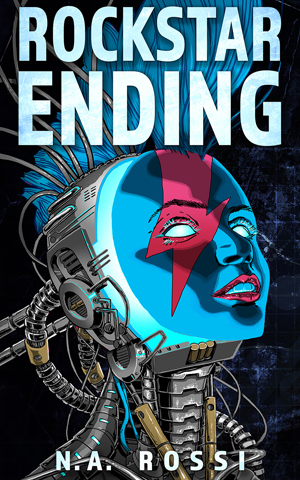
Cover of Rockstar Ending.
There's a bit in
Rockstar Ending ... the main protagonist is a woman called Lexi, who is a teacher, and she finds out about all the bad stuff going on. She has a partner called Bob. He is an IT geek. Bob is the Bowie obsessive, and there's a moment where ... this sounds a bit cheesy and I hope it works in the book ... but he keeps saying to her, you know, I'm not sure this is really happening, not exactly that you're imagining it, but it can't be as bad as you say. And he goes off and discovers that his friend's father is becoming depressed and is thinking of killing himself. He goes into this man's house and he sees his Spotify playlist, and he sees the adverts that are coming up. And this guy says how much he's been enjoying listening to the song "Don't Fear the Reaper." Bob goes back to Lexi and he says, "You know, I think you're right." He actually says to her, "This is genocide." And they go back and they listen to the whole of Diamond Dogs. There's a moment when Bob really misses David Bowie, and he says, "I just wish he would come back out of that wardrobe." In the "Lazarus" video he kind of gets in ... and you know, if you miss him as much as I do--how pathetic am I? [laughs]--you know, I'm looking around the room now at my wardrobes [laughs]. There's something about that that's dreadfully poetic ...
It's like The Lion, the Witch, and the Wardrobe ...
Well, exactly! Because he has meant so much to me, I wanted to pay a tribute to him in the most legal way I could. I couldn't face writing to record companies or people who owned his lyrics to be able to quote directly from them. I know people have gotten into hot water by printing the words to songs without permission... So that's another reason why I had Spotify playlists, because I thought well, then people can listen to the songs and they can maybe understand how Bob feels when he listens to all the lyrics of an album, and they say, "We'll ... jump in the river holding hands." That sounds like the only thing that those people in
Diamond Dogs can possibly do to make them happy.
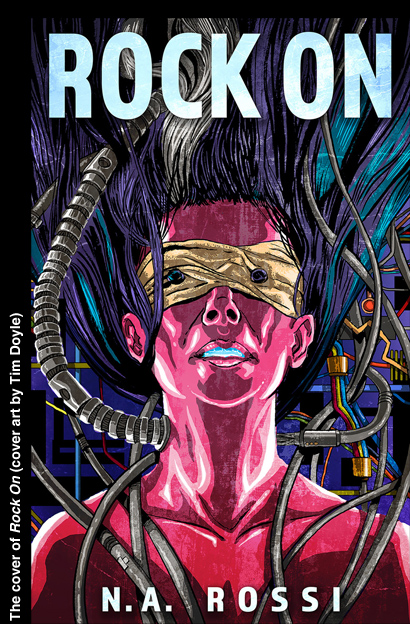
The cover of Rock On, second in the Rockstar Ending series (cover art by Tim Doyle).
So the books are also a tribute to him. He is such a huge cultural influence. You can see the Bowie Lazarus mask on the cover of
Rock On, with the terrifying button eyes. I have some characters living in a place called Lazarus House. It's a presbytery that becomes a safe house. The priest who's in charge hasn't a clue about the Bowie angle, but the readers know.
So I've talked about music being used to manipulate people in a negative way, but in
Rock On, there is a group of people who have been at risk of getting a Rockstar Ending, or getting an Ending--most of them are too poor to qualify for the Rockstar version--but they're living together in the safe house, and Bob is worried that they're going to be targeted again. So he sets up an offnet server with a load of happy songs. While they're in the house, they can't listen to any music with suicidal ideation. They're all things like "Happy," or he even puts in "My Sweet Lord" to keep the priest sweet. He's trying to beat the corporation at their own game. And of course there's "Let's Dance" there as well, because they're trying to keep them moving. Bob tries to turn the tables using music.
But as well as the actual music being enjoyed in the books, I draw on wider music-related imagery. One of the things Bob does in Rock On, because he's so obsessed with Bowie, he has this sideline--he makes Faraday pouches for people to keep their phones in, and they're all printed with bootleg Bowie covers. So I put those in there. And other people have different ones that aren't necessarily Bowie. So just the way people try to bring music into their lives in all sorts of funny little ways.
Bowie went through so many different incarnations. Do you find that you write in ways that are influenced by each of those?
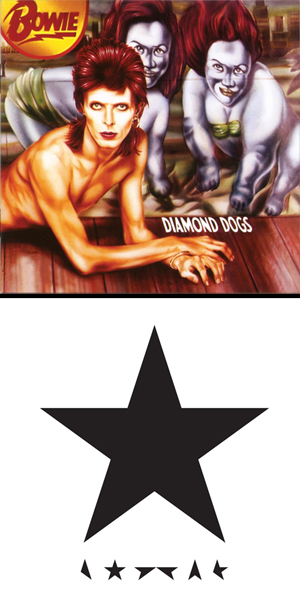
Covers of David Bowie's Diamond Dogs and Blackstar.
I would say
Space Oddity, Ziggy Stardust, Diamond Dogs, and
Blackstar are the four that I have drawn on most of all. Oh, and I'm just in the middle of putting "Ashes to Ashes" in the latest book, but that's not out yet. There's an angle for doing that ...
Is that book part of the same series?
So book three,
Rockaway, which I'm working on at the moment, yeah, I've just popped "Ashes to Ashes" in there. So they keep bubbling up ...
"Ashes to Ashes" is one of my favorites through time ...
Yeah. He did the New Romantic thing before anyone else really with that Pierrot figure.
Right. I remember seeing that video on a local station that did music videos, before MTV was around, and because it was over the air and wasn't one of the main stations, it was often a bit staticky, which fit right in with my growing punk-rockism, where if you weren't listening to it on a thirdhand cassette tape that sounded like someone recorded it in their bathroom or something, then it wasn't authentic.
It's interesting that local TV thing, isn't it? I grew up in the northwest of England, and we had a television programme ... have you seen a film called
24 Hour Party People, have you heard of it?
I haven't, no.
OK. It's a very British thing. There was a guy called Tony Wilson, Anthony Wilson, and he ran a nightclub called The Hacienda in Manchester, and it's where the Happy Mondays ... Well, he was the manager for Joy Division for a while, and he's famous because they didn't have a contract. Very much an intellectual, situationist kind of a guy, and there is a great film called
24 Hour Party People which is about his life. It's done in a very funny way. But he was also on local TV. He was a news reporter for local TV, but he also had a music programme called
So It Goes, and he was the first person to have Blondie on television in the UK. On this unconventional little local TV show, he had the most amazing acts. He was extraordinary.
So now, where would someone be if they were doing that? They wouldn't be in a TV station, would they, because TV's gone too corporate.
But "Ashes to Ashes," that video was totally groundbreaking.
Yeah, and he continued in that vein, maybe not with every video, but definitely as time went on he was always trying to be doing something a little different.
Yeah, I think that's right. I mean, I was never really into Tin Machine, but one of my readers, I had a competition in my newsletter for people to tell me what concerts they'd been to, just because I was trying to get people to engage. I had some lovely ... I had someone who'd seen Led Zeppelin at the Pontiac Silverdome, someone who'd seen The Clash on a Mississippi riverboat, someone who'd seen a German folksinger I'd never heard of, and someone who'd seen Tin Machine in Glasgow. It was at a time when Tin Machine, well, no one liked them, and she had a t-shirt that said she did like them. I think it actually said "Fuck you, I love Tin Machine." She said, "He saw my t-shirt ... here's this video footage and he made a sign." It's true! I've seen it. Bowie made the rock horns salute. Tin Machine was never my thing, but we talk quite a bit about music, nevertheless.
He had a brief Jungle phase I think, which was never my thing, but I think "Lazarus" is a real return to form.
Do you expect that music will also play an important part in future novels and short stories?
I certainly think that as long as I keep going with the Rockstar Ending series, they've got to have the playlists, because the music is such an important part of them. So certainly this series, as long as I keep going with it ... [laughs] I started off with one book, and then I started describing it as a trilogy, and now I've started calling it a series, so I think I'm going to see how I feel. What I've said to myself is I'll finish the third one, and then I'll focus for a while on the marketing a bit more. I really want to have the three together with the covers by the same artist [Tim Doyle], and have a physical box set, and then I'd love to see it on the screen. That's another whole work package to try and get that done as well. But I think it would work quite well, again, because of the music.
You know, look at the way people use music in drama now, even something like Mind Hunter, or even something like Westworld; the way they use music in all of those dramas I think really adds something, drawing on contemporary music. Oh, The Sopranos, there's another example, the way they use the theme tune for that, or the way they brought in John Cooper Clarke. Do you know John Cooper Clarke?
No.
He's someone very British as well. He was a punk poet. He still is a punk poet. And for a while he had a sort of missing period when he was taking a lot of heroin and living with Nico, the woman who was with the Velvet Underground. So they lived together in a sort of haze for many years, and then he came out of that, he said because everyone he knew was really worried about him and it wasn't fair on them, and he's been touring again. He did a poem called "Evidently Chickentown" in
The Sopranos. You wouldn't think that you would put a piece of dissonant punk poetry in the middle of The Sopranos, which is about an Italian American gangster experience. But it works brilliantly. So I think it's very interesting the way that, TV dramas, they've become very catholic in the sense of, they draw in lots and lots of different kinds of music to add to the dramatic experience. That's like what I'm doing with my books. It brings in another dimension.
It's also really good shorthand. So there's a scene in Rock On where there's a work party, and it's a Noughties Party, and so two of the characters, one comes dressed as Kylie Minogue, and the other one comes dressed as Madonna. So there's "Can't Get You Out of My Head" and Madonna's "Music" that they use, and there's Ali G in the pimp tracksuit that he wore in the video for it, and I think it just sums up a moment in time, and it instantly brings in references. And you could go so far as to ... I sit watching the YouTube videos of these songs to remind myself what they're like, what it was like at the time, how I might draw on that outfit, to put my characters in a particular costume, because again, it's shorthand for being a rock star, essentially. And these two female characters, they turn themselves into rock stars temporarily, at a party where they're celebrating the success of the Rockstar Endings programme. I hadn't even realised I did that until I just told you, but I did [laughs]. The subconscious is a terrifying thing, isn't it?
Another device I've created is a fashion exhibition where they use the outfits of Pete Burns, who was in Dead or Alive, and, again, I just had a lot of fun with that, because I was watching his videos and all his different outfits, and I thought, well, Bowie had his fashion exhibition, which, again, I never got to, but I'd been looking at a catalogue, and I thought why not do that about a punk figure? Why wouldn't you do that?
So do you find that, because you've used music in this way in your writing, does that create a different, or better, interaction with your readers?
I think I'm still looking for readers all the time. One of the reasons I noticed you is because speculative fiction is such a peculiar genre, because it's adjacent to so many different things, and I struggle with working out what genre I am. Speculative fiction fits it. It's kind of political, the way Orwell's political, but I think it's funnier than the books you usually find in the speculative fiction realm. But yeah, the readers I've had the most interaction with tend to be people who love music. I have one reader who's bought the poster of the Tim Doyle illustration and sent me a picture of it in pride of place, on his wall. I was talking to a poster shop nearby, they're selling the artwork, and they said there are Bowie fans who collect everything. But I'm not sure the Bowie fans who collect everything are always interested in [the] reading. You know, if you think of a Venn diagram, a Bowie fan, you're going to love the music, you might not necessarily read the same books he read or any of the other stuff. Or you might be interested in fashion or something ... I think because he had so much appeal, definitely there is an emotional engagement with people who get him and like my books. I have noticed that with some of them. And it's deep.
N. A. Rossi's Rockstar Ending series can be found on Amazon (Rockstar Ending
at mybook.to/RockstarEndingPaper and Rock On
at http://mybook.to/RockOnPaperback) or at other booksellers. You can also find the prequel novella, For Those about to Rock
, free from the author in return for signing up to mailing list (https://dl.bookfunnel.com/qct6iehw5t) or to buy on Amazon (https://www.amazon.com/gp/product/B0821H5YDC/).
The Spotify playlists are at:
For Those About to Rock
: https://open.spotify.com/playlist/370EIRqS4g7ArE8l0lPbVc?si=huW3KDeVT-qpjTBFeAgbZA
Rockstar Ending
: https://open.spotify.com/playlist/0yHChmj7qM6l8e Uppa0nhA?si=wB_5AR15SvSJEjHmR3OqlQ
Rock On
: https://open.spotify.com/playlist/05CO2YDWVJVMARY 4jtebJJ?si=NjHdcNS2RCKI9NOUDUwpcA
She can be found on social media on Twitter (@NicolaRossi), Instagram (@rockstarending), and others.







